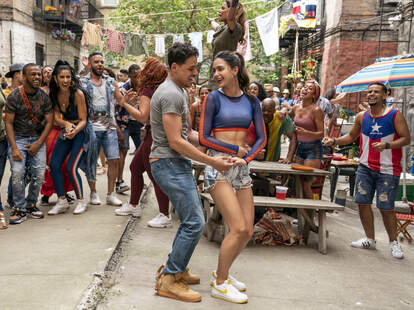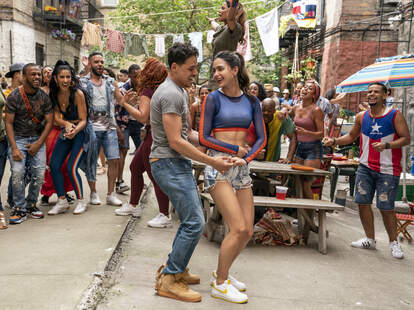
You are going to want to see it on a big screen.

Warner Bros.
After the year we had in 2020, it makes sense that 2021 is shaping up to be the year of the movie musical. At least five major movie musicals are on the calendar, and the all-singing, all-dancing cinematic extravaganza kicks off with the exuberant, joyous, and enervating In the Heights, adapted from Lin-Manuel Miranda’s first Broadway outing and directed by Crazy Rich Asians‘ Jon M. Chu.
There arguably has not been a great stage-to-screen translation of a musical since Chicago in 2002. It’s not as if there has been a complete deficit of characters breaking into song—La La Land shut down a Los Angeles freeway and won a bunch of Oscars; Lady Gaga belted her guts out in A Star Is Born—but those were entirely cinematic outings engineered for that medium. To take something that worked well in the confines of a theater and translate it on screen is an often fraught endeavor, but Chu is more than up to the task and In the Heights is the perfect material.
Chu has created a spectacle that uses all the tools film has to offer, and fills every inch of the screen. Though In the Heights is being released on HBO Max at the same time it hits theaters on June 10, it practically demands to be viewed on as large a screen as possible. If you’re squinting at a TV set or a computer, you might miss some of the details painted on the walls of the bodegas or the dancers tucked into the corner. Chu successfully blends the heightened reality that the genre requires with the energy of shooting on location in the streets of Washington Heights. A veteran of the Step Up franchise, Chu treats every extra walking the streets of upper Manhattan as a member of his chorus.

Miranda, now best known for his Pulitzer Prize-winning Hamilton, began working on In the Heights when he was still in college, and it’s as much a raw storytelling endeavor as an act of preservation, documentation, and homage. There isn’t much to the plot itself: Through Miranda’s songs and a script by playwright Quiara Alegría Hudes, In the Heights is a portrait of a community over a couple of blisteringly hot summer days as its members reconcile their own aspirations with encroaching gentrification.
At the center of this narrative is Usnavi, a role originated by Miranda and now played by Hamilton veteran Anthony Ramos, in a star-making performance. The minute he utters the words, “Hey y’all, good morning,” in the opening number with a raspy voice and bedroom eyes, he puts the audience under his spell. Usnavi runs the corner bodega, passed down from his now deceased parents, and dreams of going back to the Dominican Republic and reviving his father’s beachside bar, all while pining after Vanessa (Melissa Barrera), who works at the nail salon across the street but wants to move downtown and become a fashion designer. Usnavi lives with Abuela Claudia (Olga Merediz), the matriarch for the entire block, and supports his teenage cousin Sonny (Gregory Diaz IV).
The rest of the characters all rely on Usnavi’s cafe con leche: There’s Kevin Rosario (Jimmy Smits), who runs the local cab company but has recently sold half his building to pay Stanford tuition for his daughter Nina (Leslie Grace). She’s home for the summer, but harboring the feeling that she can’t cut it at the prestigious university after being on the receiving end of a series of microaggressions. At the same time, she’s rekindling her romance with Benny (Corey Hawkins), an employee of her dad’s. (Don’t worry: Miranda does show up as a piragua vendor who gets into a fight with the Mister Softee man portrayed by original cast member Chris Jackson.)
Miranda, Hudes, and Chu have made only a few alterations, most notably the introduction of a framing device in which Usnavi, on a beach (implied to be in the Dominican Republic) from sometime in the future, tells the story of Washington Heights to a group of children. It’s a convention that eases the audience into fourth wall-breaking that would be natural in the confines of a Broadway house. Initially, it seems like a bit of a labored addition until it pays off beautifully in the final act.

One of the reasons that the cuts to Usnavi on the beach initially seem out of place is that they are static compared to what Chu captures on 175th Street and Audubon Avenue. Too many modern movie musicals are plagued by inertia; that’s not the case with In the Heights. When the characters open their mouths to sing the vibrancy pops off the screen. Instead of using green screens or CGI wizardry to make Miranda’s metaphors literal, Chu decided to rely on the magic of New York City streets. There are occasional moments of animation, but they never overtake the performances or the surroundings. During Nina and Benny’s “When You’re Home,” pickup basketball players are the backdrop for their duet, and an argument over dominos turns into a ballet. Dance is frequently almost diegetic in Chu’s world, often blending seamlessly with the action. In “96,000”—arguably the most thrilling sequence—the choreography emerges from pool revelry as the crowd learns that Usnavi’s bodega sold a winning lottery ticket.
I’ve already mentioned how Ramos instantly secures his future as a leading man, but every single member of the cast is giving it their all, infusing their vocals and movements with life. Merediz, the one person who resumes her role from the Broadway production, makes astounding work of her solo “Paciencia y Fe,” which also features some of the movie’s most revelatory choreography.
In the Heights is celebratory from beginning to end. It’s a celebration of the sheer talent on screen, of the Latinx experience, of the power of its genre. If this is the way the year of the musical begins, it’s a perfect start.
Our Newsletter